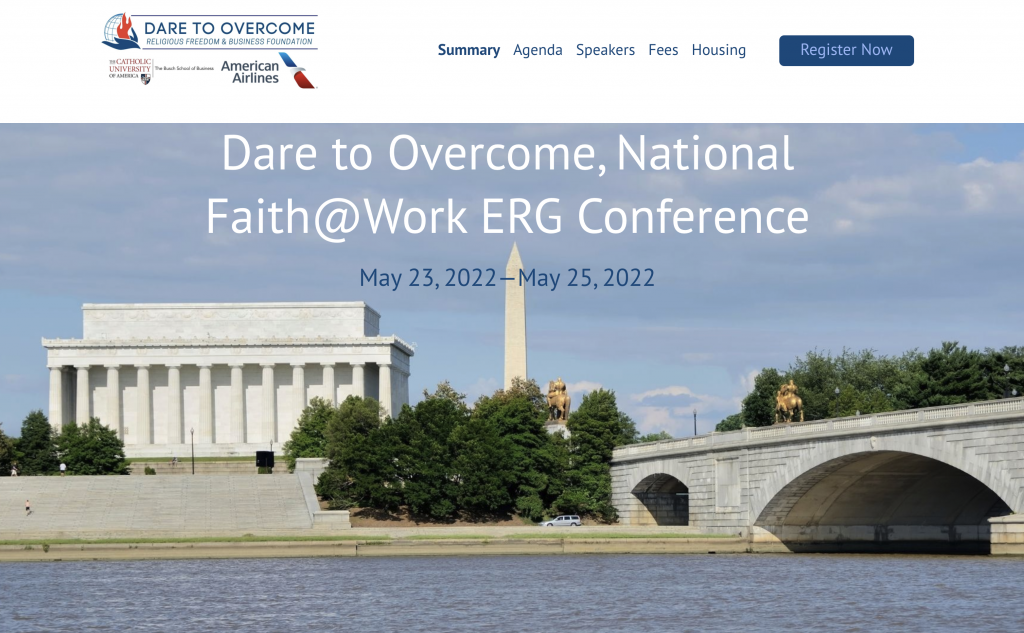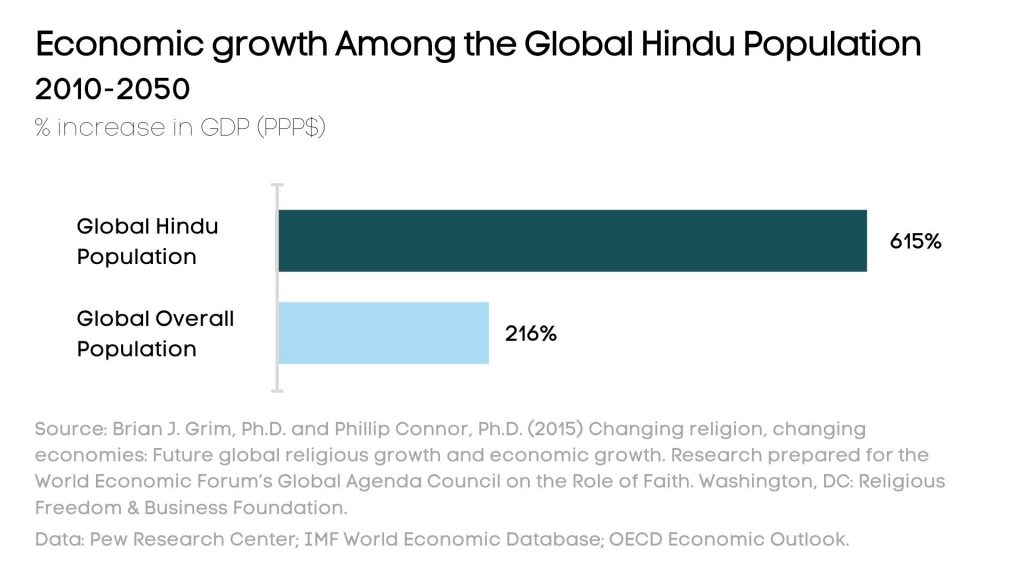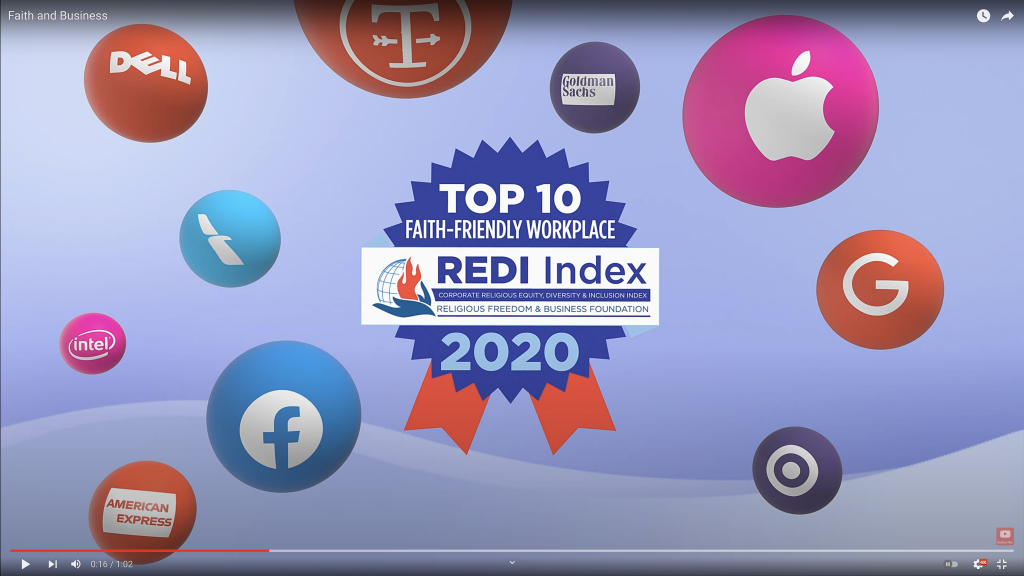National Faith-Oriented 2022 ERG Conference Registration Open!
As Biden Convenes Global Democracy Summit, China’s Restrictions Multiply
3 Dec, 2021
 by Brian Grim
by Brian Grim
On Dec. 9-10, the Biden Administration will convene a two-day virtual Summit for Democracy, kicking off what’s billed as a “year of action” intended to buttress democracy against the worldwide trend of rising authoritarianism, with an in-person gathering planned for December 2022.
The backdrop for this is, of course, the assertive posture that the People’s Republic of China has taken under Xi Jinping’s leadership.
This week the Economist explores whether the draconian Covid restrictions in China (and I’d add the massive incarceration of Uyghurs in Xinjiang and suppression of democracy in Hong Kong) may point to systemic and serious weaknesses. For instance, by highly restricting international travel, the economic costs are not just losses for the travel industry, but also for future competitive innovation, as illustrated by this quote from the Economist:
“Jack Ma, the founder of China’s giant e-commerce platform, Alibaba, started his first web company after a visit to America in 1995. Cao Dewang, the boss of Fuyao Glass, a Chinese company made famous by the documentary “American Factory”, ventured into manufacturing after a trip to the Ford Motor Museum in Michigan. (The museum’s significance struck him only on the plane home, he told an interviewer, so he immediately booked a return flight to make a second visit.)”
A free link to the full article is available here.
Anther sign of a move away from the innovation sector is that new graduates are shunning innovative tech industry jobs for what are perceived to be stable civil service government jobs. Indeed, “More than 2.12 million candidates registered for China’s national civil service exam – known as the guokao – that took place this week. The figure was up sharply from 1.58 million last year, 1.05 million in 2009 and 125,000 in 2003. This year, they’re competing for about 31,200 jobs at 75 central government agencies and 23 attached institutions, giving them a 1-in-68 chance of success. Those hired will start their new jobs next year,” reports the SCMP (owned by Alibaba).
Additionally, China’s ongoing crackdown on religion adds another weight dragging down what has been remarkable economic growth spurred on by the relative religious openness following the Cultural Revolution of the 1960s-1970s.
In “Chinese Secret to Sustainable Economic Growth: Under Threat?” I make a data-driven argument showing that as China continues to impose extreme restrictions on religion and religious groups, the prospects for its continued economic decline grow.
Six Top U.S. Tech Execs Now India-Born
30 Nov, 2021
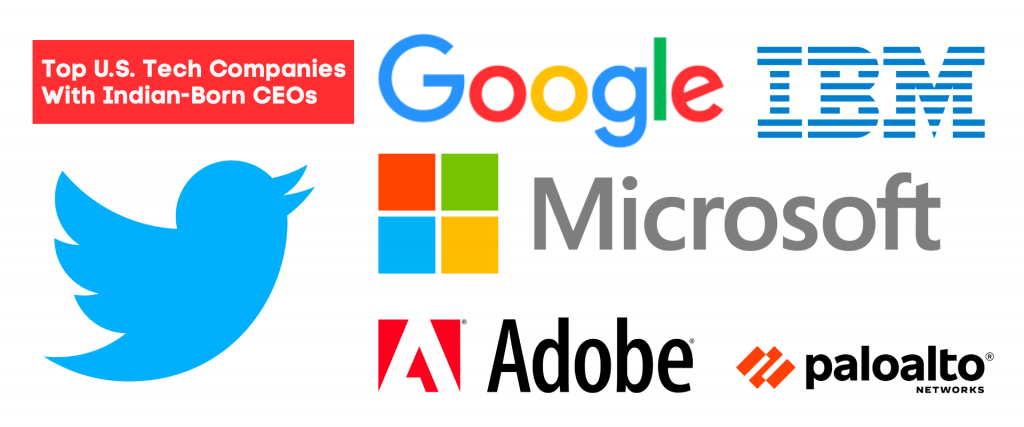
by Brian Grim
Little-known data point: Hindu populations projected to have fastest growing economies by 2050
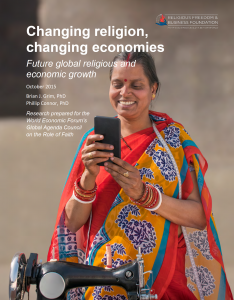 Six top U.S. tech companies now have India-born CEOs with this week’s appointment of Parag Agrawal as Twitter’s new CEO. While it is not a matter of public record whether all of these CEOs practice Hinduism (and certainly not all India-born CEOs do, e.g., Span Construction CEO King Husein is Christian), having a rising number of US India-born CEOs draws attention to a little-known data point from our study prepared a few years ago for the World Economic Forum’s Global Agenda Council on the Role of Faith.
Six top U.S. tech companies now have India-born CEOs with this week’s appointment of Parag Agrawal as Twitter’s new CEO. While it is not a matter of public record whether all of these CEOs practice Hinduism (and certainly not all India-born CEOs do, e.g., Span Construction CEO King Husein is Christian), having a rising number of US India-born CEOs draws attention to a little-known data point from our study prepared a few years ago for the World Economic Forum’s Global Agenda Council on the Role of Faith.
We estimate that global GDP at the disposal of Hindu populations is expected to increase by 615% between 2010 and 2050 (see chart). This growth in GDP is substantially more than projected overall global GDP growth of 216% for the same time period. This not only outpaces overall growth, but is makes Hindus the fastest growing economic group among all major religions, according to the study.
This means we can expect to hear much more from Hindus on the global stage in the coming years. That can, of course, be very good when compared to the anti-religious stance of their giant neighbor, China, as long as the voice is one that promotes a faith-friendly future for all (including those without a faith), as espoused by Covenantal Pluralism.
But the challenge is real: A recent survey by the Pew Research Center finds that Indians generally say they do not have much in common with members of other religious groups, and large majorities in the six major groups say their close friends come mainly or entirely from their own religious community.
On the other hand, there is a tremendous open door for Covenantal Pluralism to grow: The same Pew survey found that most people (84%) say that to be “truly Indian,” it is very important to respect all religions (see chart). Indians also are united in the view that respecting other religions is a very important part of what it means to be a member of their own religious community (80%). People in all six major religious groups overwhelmingly say they are very free to practice their faiths, and vast majority (91%) say that people of other faiths also are very free to practice their own religion.
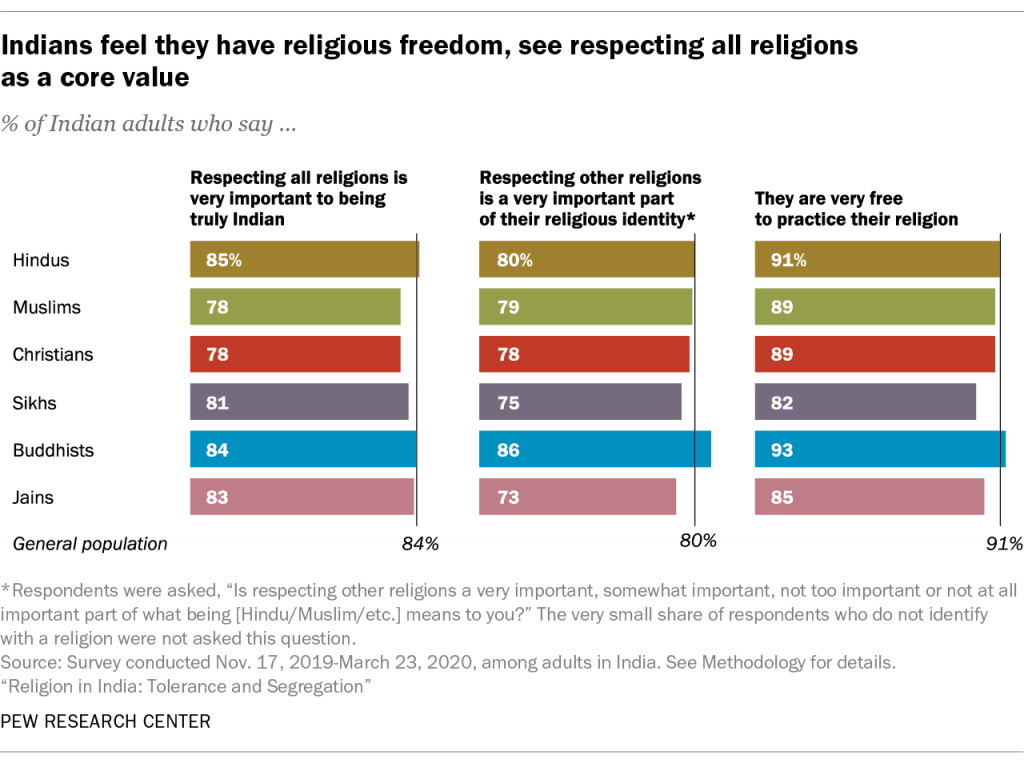
The open door for Covenantal Pluralism is even more evident (and promising) when looking at common practices across India’s religious groups. Pew’s study also finds that India’s religious groups share several religious practices and beliefs (see chart): “After living side by side for generations, India’s minority groups often engage in practices or hold beliefs that are more closely associated with Hindu traditions than with their own. For instance, many Sikh (29%), Christian (22%) and Muslim (18%) women in India say they wear a bindi – the forehead marking often worn by married women – even though the bindi has Hindu origins. Meanwhile, Muslims in India are just as likely as Hindus to say they believe in karma (77% each), as do 54% of Indian Christians. Some members of the majority Hindu community celebrate Muslim and Christian festivals: 7% of Indian Hindus say they celebrate the Muslim festival of Eid, and 17% celebrate Christmas.”
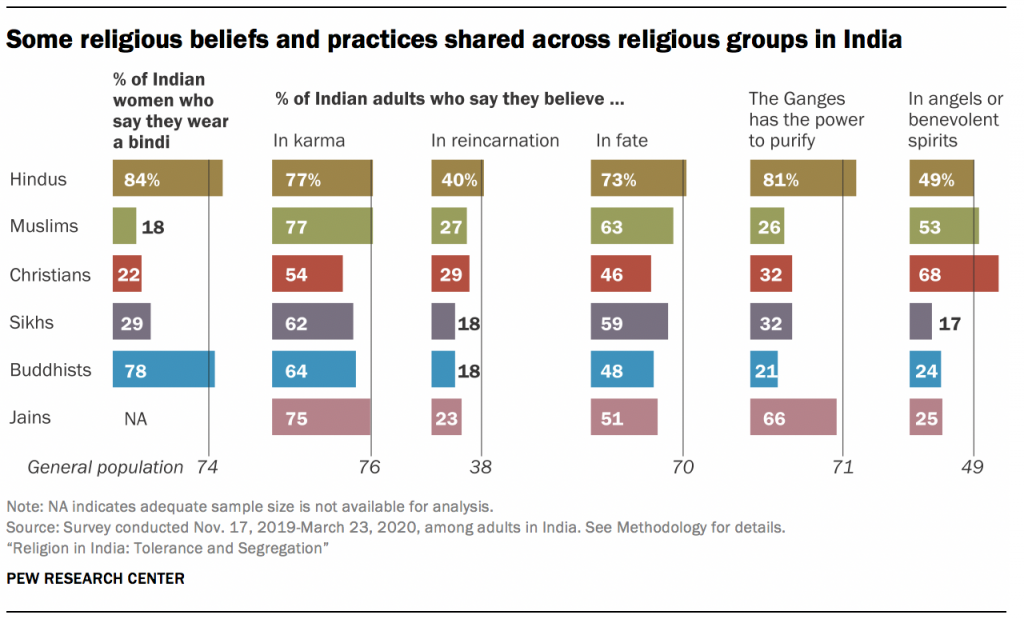
While Western Christian theologians might scratch their heads to find that nearly a third (29%) of Indian Christians believe in reincarnation (just 11 percentage points fewer than Hindus, 40%), it reveals the actual beliefs and practices of people. As the Religious Freedom & Business Foundation emphasizes in its religious literacy programs for corporations, people cannot be best understood by beliefs theologians may hold, but by their actual beliefs, what faith organizations they belong to, and their behaviors, which may be idiosyncratic or cultural, rather than dogmatic or religiously mandated.
This open door of shared beliefs and practices – as shown by the Pew data – is one which companies in India can capitalize on and be the drivers of mutually respectful engagement across faith traditions, as is demonstrated by one of our 2021 Global Business & Interfaith Peace Award winners, Candice Corby, CEO of US and India-based Cobra Legal Solutions.
The text of Corby’s Award states: “Cobra provides rights and freedoms for all religions and beliefs in the workplace and promotes the celebration of religion and belief, encouraging employees to be their full selves including bringing their faith and beliefs to work. Cobra Legal Solutions accomplishes the goal of being a religiously inclusive workplace by observing every festival and religious holiday world-wide and by hosting a commemoration for religions in a week known as “Cobra Life Week” [see video].”
And for an example of an Indian-born CEO working for religious freedom, see this video:
Thanksgiving as a Corporate Operating Policy
24 Nov, 2021
by Brian Grim
So many things divide societies today, and the challenges to the human right to freedom of religion or belief are real. Many focus on the problems, but the Religious Freedom & Business Foundation (RFBF) focuses on what’s working.
As I reflected on Thanksgiving this year, I realized that gratitude is the operating philosophy of RFBF’s work.
There’s a verse in scriptures that fleshes out this philosophy: “Whatever is true, whatever is honorable, whatever is just, whatever is pure, whatever is lovely, whatever is gracious, if there is any excellence and if there is anything worthy of praise, think about these things” (Phil. 4:8).
I bolded the last part because that’s what I have so much fun doing in my work – shining a light on those excellent things worthy of praise. Whether it’s through our CEO awards, corporate REDI Index, or Women’s Film Awards, all are guided by this philosophy.
In the 50-second video below, I share why this is so much fun as well as offer it as a short thought today as Americans celebrate Thanksgiving tomorrow.
Why 2022 will be the year of the worker, and how that relates to religion
19 Nov, 2021
 by Brian Grim
by Brian Grim
The Economist predicts that 2022 will be the year of the worker — workers will have more bargaining power than they have had for years, in some ways as a result of the pandemic.
Why?
According to the Economist: (1) Many people can work from home, boosting both happiness and productivity. And given a new Pew Research Center study showing that “family” is overwhelmingly where most people find meaning in life, working from home arguably then may allow for more meaningful work. (2) AI is not en masse replacing workers. (3) Politicians and central bankers are focused on reducing unemployment rather than reducing inflation or cutting public debt, avoiding a “jobless recovery.”
Indeed, employers offering low wages or poor conditions are struggling to fill positions.
The US Faith Factor
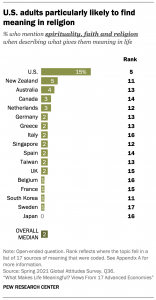 For a growing number of workers, particularly in the United States, poor conditions include needing to leave their faith (including non-theistic beliefs) at the door when they show up for work. However, the rapidly growing faith@work movement among the world’s best companies gives faith-friendly companies a competitive advantage in a tight job market.
For a growing number of workers, particularly in the United States, poor conditions include needing to leave their faith (including non-theistic beliefs) at the door when they show up for work. However, the rapidly growing faith@work movement among the world’s best companies gives faith-friendly companies a competitive advantage in a tight job market.
Why?
(1) Recruitment, retention and revenue are stronger when workers’ faith identities are valued. (2) Faith-friendly workplaces allow workers’ deepest inspirations to have a place in the workplace = innovation. (3) Workers’ desire for purpose and meaning are reinforced by faith-friendly workplaces.
This is an especially important dynamic in countries where religion is an important part of life, such as the United States, where faith among adults in the US is ranked of much higher significance when compared with other developed nations. The same Pew Research Center study of 17 advanced economies found that US adults were particularly likely to find meaning in religion.
In fact, “spirituality, faith and/or religion” was among the the top five things that American adults listed as giving meaning in a survey, from among 17 topics coded from the open-ended responses to what gives them meaning in life. As shown in the chart, occupation and faith are ranked similarly in the US.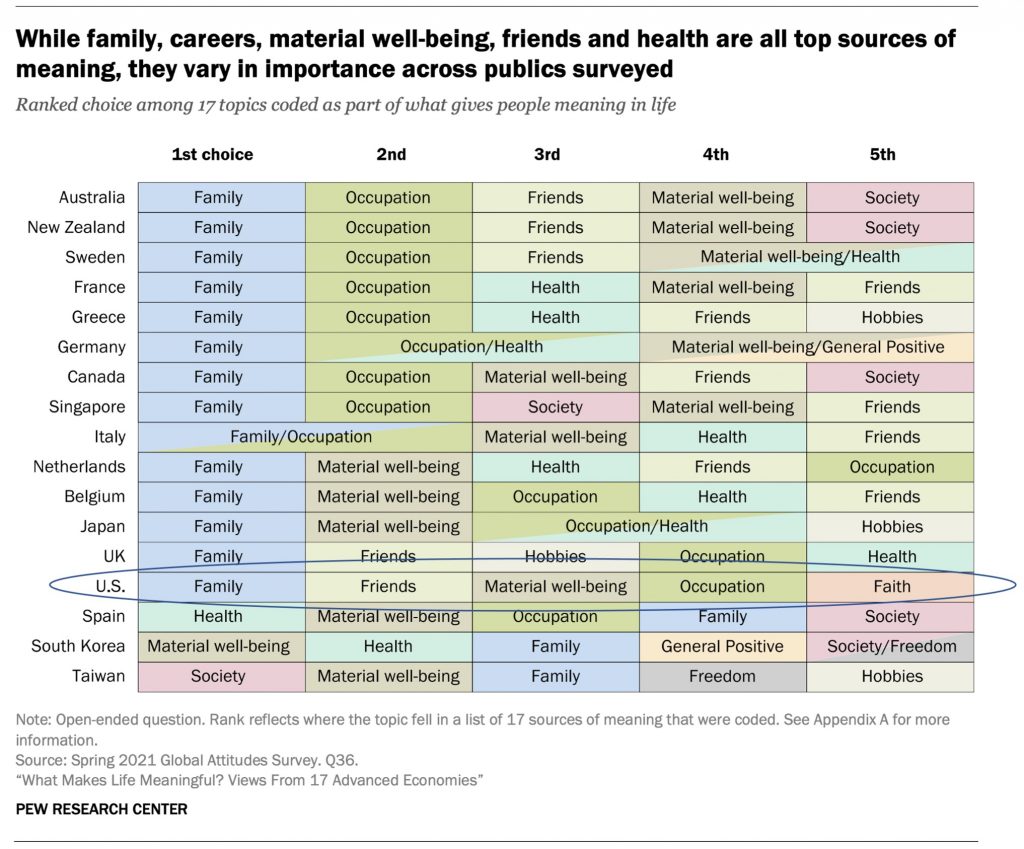
Learn more about the faith@work movement in the short video below.
Why does a Fortune 100 company have 100 chaplains?
16 Nov, 2021
Pictured: Brian Grim, John Tyson (Chairman), John Randal Tyson (Executive Vice President, Strategy and Chief Sustainability Officer), and David W. Miller (Director of the Princeton University Faith and Work Initiative)
Monday evening I heard why it matters to the Tyson’s Chairman & Chief Sustainability Officer: It’s a Core Value.
By Brian Grim
On Monday evening I had the honor of presenting the 2021 Global Business & Interfaith Peace Award to John Tyson, Chairman of Tyson Foods, at their annual Chaplain Conference.
 Before the award, John and his son John Randal shared with the 100 Tyson chaplains how their work is much more than a program, but a reflection of the Core Values of the company. The discussion, moderated by Princeton’s David W. Miller, was followed by a town hall Q&A with the chaplains, who have been on the frontlines providing compassionate care in the plants across America durning the pandemic.
Before the award, John and his son John Randal shared with the 100 Tyson chaplains how their work is much more than a program, but a reflection of the Core Values of the company. The discussion, moderated by Princeton’s David W. Miller, was followed by a town hall Q&A with the chaplains, who have been on the frontlines providing compassionate care in the plants across America durning the pandemic.
As John said, “From the beginning, our company has been built on faith, family, and hard work. That tradition, our Core Values, and ‘doing what’s right’ are deeply embedded in our culture.”
In the video you can hear the rationale in John Tyson’s own words. And in the graphic below, you can read Tyson Foods’ Core Values, which includes “Striving to honor God and be respectful of each other, our customers, and other stakeholders.”
Read more about John’s award here, which was presented virtually in August.
Congratulations John, Tyson Foods, and your Chaplains, who come from multiple faiths and denominations serving 141,000 team members in more than 150 facilities!
Congratulations to our partner American Airlines for going to Delhi!
14 Nov, 2021
 By Melissa Grim
By Melissa Grim
American Airlines has resumed flights directly from NYC to New Delhi after over a decade hiatus reports The Times of India. American Airlines’ inaugural flight landed at New Delhi’s IGI airport November 13, 2022.
American’s Tom Lattig stated that there is “tremendous demand for travel between India and the US, thanks to the large diaspora and growing business ties. The pandemic has led to a preference among people to travel non-stop instead of going one-stop.”
American Airlines Newsroom reports that while “Other airlines try to make old routes new again, American has continued to operate its international schedule during the pandemic.” American is currently the fastest growing international carrier in New York and the non-stop trip to New Delhi is part of 10 new international flights the carrier offers.
RFBF President Brian Grim says that “I am very excited about the partnership we have with American Airlines to host our Dare to Overcome in India in 2023 during the G20! Looking forward to flying the JFK Delhi route on January 22 to start the planning! Join us in 2022 for Dare to Overcome in Washington DC – the precursor to India 2023!”
American Airlines is the global partner and official airline of Dare to Overcome.
“Dare to Overcome” is the branding going forward for our annual Faith@Work ERG conference. In 2022, it will be an in-person gathering where Fortune 500 faith-and-belief employee resource groups (ERGs) come together to share best practices and build supportive, intersecting networks nationally and globally.
The 2022 theme is “Better Together,” reflecting an emphasis being strong allies of others — with a special focus on those with differing abilities. Dare to Overcome will be held in Washington DC in partnership with the Busch School of Business, May 23-25, 2022, and then move onwards to India in 2023.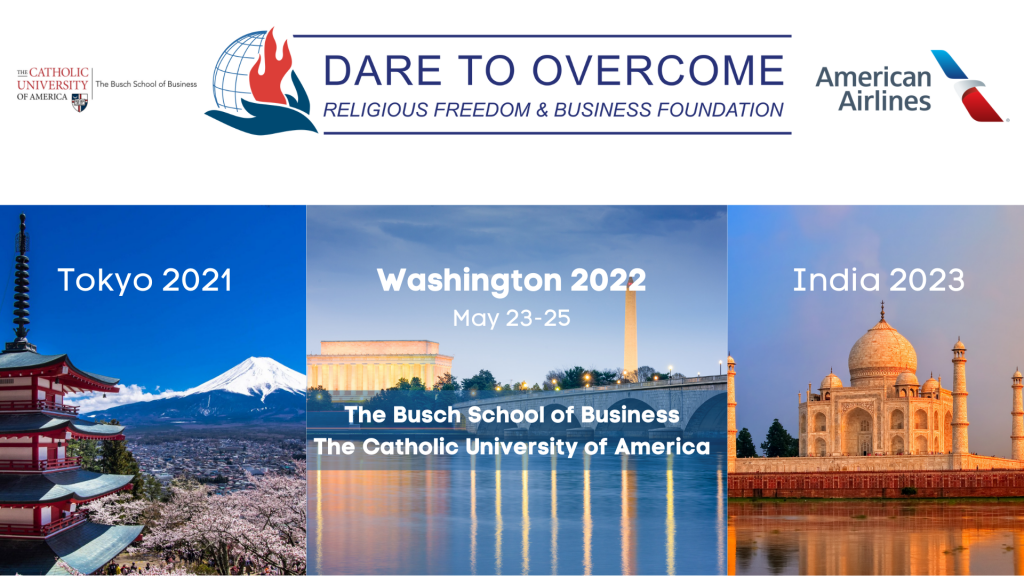
Davos and Religious Impact
10 Nov, 2021
 By Brian J. Grim, Ph.D. This is part of our ongoing blog series, Authenticity & Connection.
By Brian J. Grim, Ph.D. This is part of our ongoing blog series, Authenticity & Connection.
We’re just two months out from Davos 2022, the annual meeting of the World Economic Forum (WEF). From January 17-21, 2022, the world’s foremost business, government and civil society leaders will convene in person in Davos-Klosters, Switzerland, to address economic, environmental, political and social fault-lines exacerbated by the pandemic.
With the stated commitment of “improving the state of the world,” religion has long had a significant part at Davos. While this is surprising to some, the outputs from the WEF’s global agenda council on the role of faith, which fellow Religious Freedom & Business Foundation Board member Chris Seiple and I had the honor of chairing a few years ago, reveal a side of Davos most media reports miss.
A lasting memory I have from Davos is the Shabbat dinner that starts just as WEF’s annual meeting closes. The tradition began during Shimon Peres’ time as Israeli president. Peres hosted the dinners every year with dignitaries and businesspeople, and the tradition has continued after his passing in 2016.
Argentinian real estate developer Eduardo Elsztain hosted the dinner I attended, during which he challenged the attendees to share how their faith interacted with their Davos experience. A testimonial service ensued, and what testimonies they were! The most memorable was an octogenarian who challenged people to celebrate their 80th birthday in a similar way as he celebrated his: he took a plane load of eye doctors to Ethiopian villages lacking eye care.
I sat at the Shabbat dinner table with Daniel Berkove, who took up the challenge from that evening with a project he’s been working on as a hobby for the past year-and-a-half: being the Executive Producer of The Blessing Israel, a music video that was launched last month with the purpose of raising awareness of and combatting rising antisemitism around the world.
The Jewish/Christian collaboration features top stars from Israel, the US, and Africa who sing, in Hebrew and English, a cover of “The Blessing,” a song that went viral last year among Christian communities around the world. The Israeli singers featured are among the most famous local performers today (Dudu Aharon, Gali Atari, Eden Meiri, Narkis and Avraham Tal). Also featured are Ricky Skaggs and Jacky Clark-Chisholm (from the Clark sisters) from the U.S., TY Bellow from Nigeria, Rahel Getu from Ethiopia, and Mynah Rams from South Africa.
Since its release, The Blessing Israel has received nearly one million views.
Next time you think of Davos, think of the blessings that can emerge when people gather together and authentically bring their faith to bear on problems facing our world.
Please be part of the solution to antisemitism, share the video …
U.S. technology receives the highest positive marks of all U.S. exports
5 Nov, 2021
 When asked to compare American technological innovations with those of other developed nations, respondents around the world give U.S. technology the highest positive marks of all U.S. exports, according to a new Pew Research Center survey. Full study.
When asked to compare American technological innovations with those of other developed nations, respondents around the world give U.S. technology the highest positive marks of all U.S. exports, according to a new Pew Research Center survey. Full study.
Part of the secret sauce within America’s ongoing success is that top tech companies ranging from Intel and Google to Texas Instruments and tech-savvy manufactures such as Ford, encourage faith to fuel innovation and teamwork.
This past week RFBF President Brian Grim was invited by the two-decade-old Ford Interfaith Network (FIN) to speak on this innovation-generating faith-friendly movement, and RFBF Senior Corporate Advisor Kent Johnson led a panel of Texas Instruments interfaith pioneers to discuss its impact. Below, see what folks from Ford and Texas Instruments have to say!
Tangible benefits of religious diversity & inclusion!
Let’s Heal the World
2 Nov, 2021
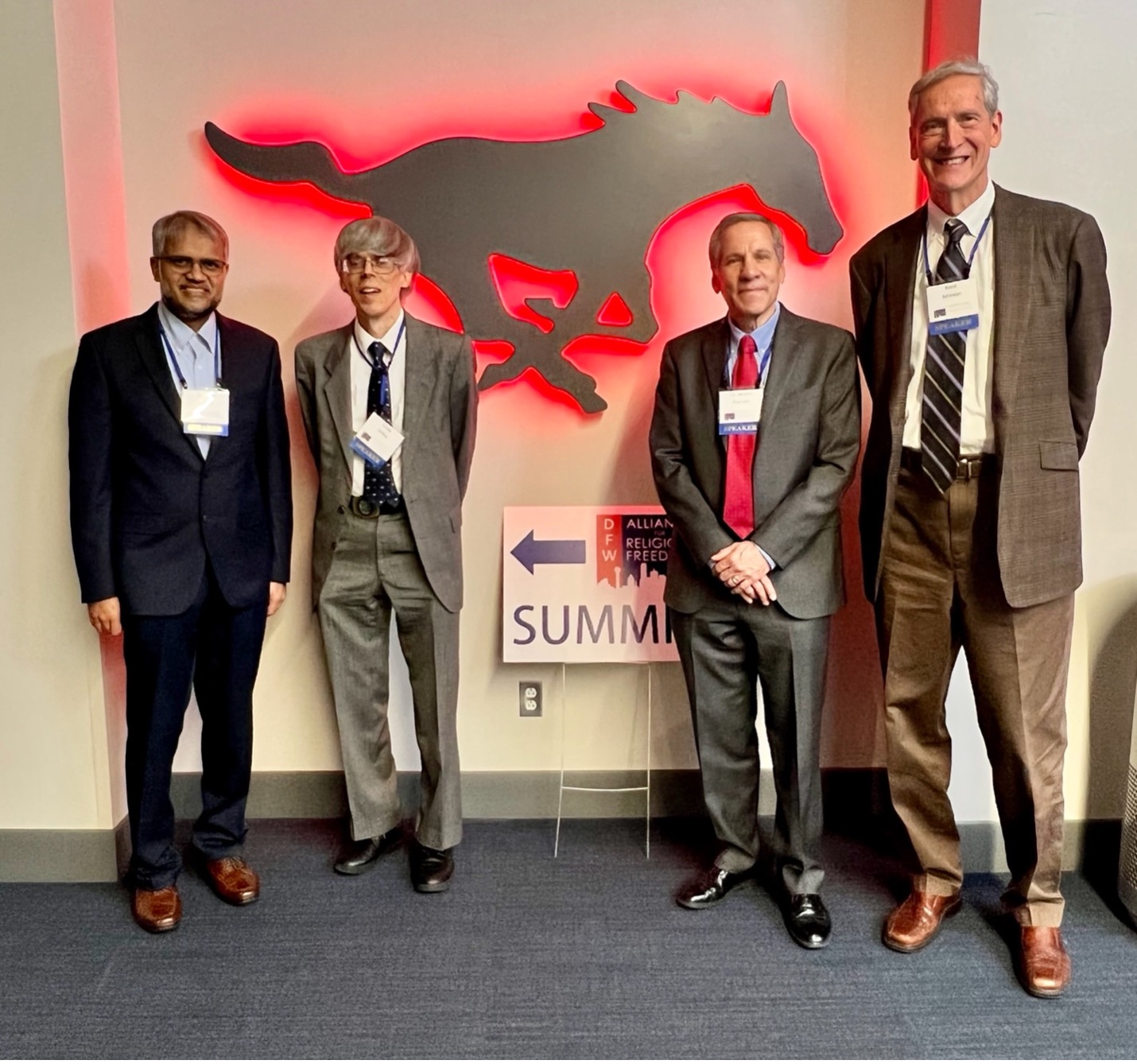
Left to Right: Dr. Siraj Akhtar, Craig Dalley, Dr. Martin Karnett, Kent Johnson
Is it realistic to hope for civility and kindness across cultural and political divides? The Religious Freedom & Business Foundation answers with a resounding YES!
Windows to hope were opened at the recent Religious Freedom & Business Foundation (RFBF) roundtable at American Airlines Headquarters, advancing workplace religious inclusion and allyship. (More about that here.)
The same week, and in the same city, we participated in the DFW Summit for Religious Freedom, where SMU’s President R. Gerald Turner testified of the strong motivation of “Gen X” to do good, and speaker after speaker described real-life breakthroughs across people of varied faiths who value human dignity. We learned about how breakthroughs for religious freedom were forged in Philadelphia when the US Constitution was set down. We heard about rescues from religious oppression; and about people of dominant faiths who, following the teachings of their faith, boldly stood for freedom of others who were unlike them. It wasn’t just words. Real life change and solid hope was displayed. It’s possible.
As RFBF’s representative, I (Kent) was privileged to shine a spotlight on the great work of Texas Instruments (see video below). I’d walked for many years alongside the TI panelists in our shared quest to strengthen civility at our company, in accordance with the teachings of our respective faiths. Getting together again was a kind of “family reunion.” What a pleasure. These dear friends – a Jew, a Muslim, a member of The Church of Jesus Christ of Latter-day Saints — are the “real deal.” My friendship with them is a good part of the inspiration behind this evangelical Presbyterian’s calling to promote the healing ministry of “authenticity and connection” in workplaces across the globe. People like them are reaching out in sincere compassion in workplaces everywhere.
RFBF has listed reams of logically compelling reasons to unleash and encourage freedom of faith expression in workplaces. The current growing interest in religious diversity and inclusion in companies across the globe is validated and fueled by solid data and information. Just spreading the word of what’s happening in companies like Texas Instruments adds to the momentum of this movement. But in the end, it’s the visceral person-to-person engagements that truly persuade, and truly heal our broken society. For that, I’m thankful that I’ve been blessed with these friends, and thankful for the many other friendships being forged across cultural lines in workplaces everywhere.
Join us, person to person. Let’s heal the world.
Latest News
Donate
Thank you for your support!

